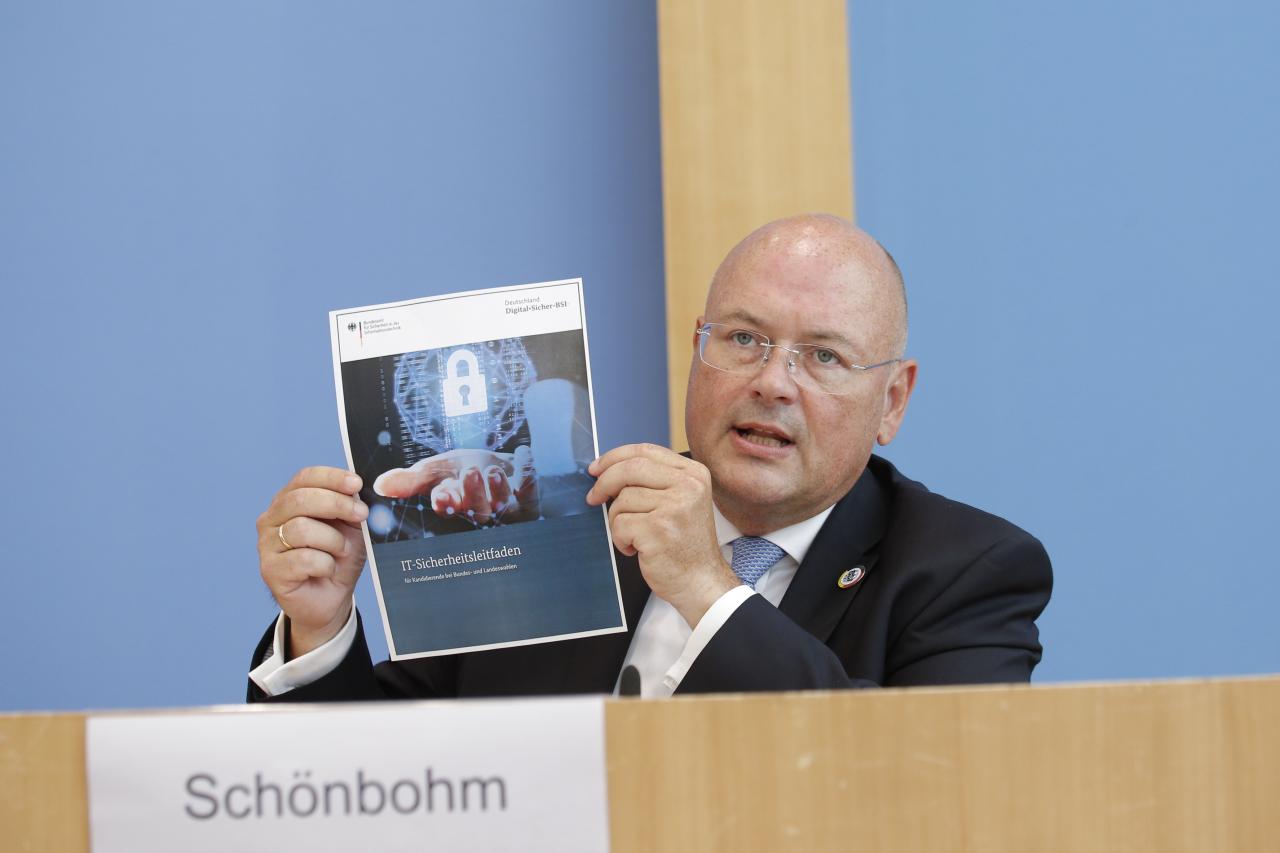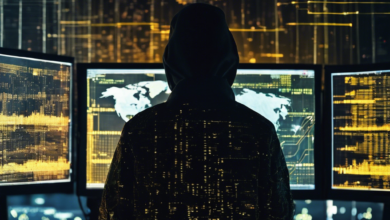
Germany Creates Nerd Army to Combat Cyber Threats
Germany Creates Nerd Army to Combat Russia and China Cyber Attacks – sounds like a sci-fi movie, right? But this isn’t fiction. Facing increasingly sophisticated cyber threats from global powers, Germany is reportedly building a specialized cyber defense force. This “nerd army,” as some are calling it, will be tasked with protecting critical infrastructure and countering the digital aggression from Russia and China.
It’s a fascinating development with huge implications for global cybersecurity and international relations.
The creation of this elite unit highlights the growing importance of cyber warfare in the 21st century. We’re talking about a silent, unseen battleground where data is the ammunition and skilled hackers are the soldiers. Germany’s move underscores the seriousness of the threat and the need for a robust, proactive defense. The composition of this force, its technological capabilities, and the ethical considerations surrounding its deployment are all key areas to explore.
Germany’s National Cyber Defense Initiative

Germany is bolstering its national cybersecurity capabilities with the establishment of a specialized cyber defense force. This initiative aims to proactively counter increasingly sophisticated cyber threats from state-sponsored actors, focusing on bolstering the nation’s resilience against attacks targeting critical infrastructure and sensitive data. This move reflects a growing recognition of the crucial role of cybersecurity in national security.
Technological Advancements in German Cyber Defense
The creation of this specialized force is accompanied by significant investments in cutting-edge technologies. This includes advancements in artificial intelligence for threat detection, improved intrusion detection systems, and the development of robust cybersecurity protocols specifically designed to withstand advanced persistent threats (APTs). The initiative also involves enhancing Germany’s ability to attribute cyberattacks, a critical step in deterring future actions.
For example, the integration of quantum-resistant cryptography is being explored to safeguard against future attacks that could exploit the capabilities of quantum computers. The focus is on creating a layered defense system that can adapt to evolving threats.
Geopolitical Implications of Germany’s Cyber Defense Strategy
Germany’s enhanced cyber defense posture has significant geopolitical implications. It signals a shift towards a more proactive and assertive approach to cybersecurity, particularly in the context of rising tensions with nations like Russia and China. The initiative also strengthens Germany’s role within NATO and the EU, contributing to collective efforts to combat cyber threats. This proactive stance could influence other European nations to increase their own cybersecurity investments and collaboration, fostering a more unified European cyber defense network.
The strengthening of Germany’s cyber capabilities also directly impacts the country’s ability to participate in international cyber diplomacy and norm-setting initiatives.
Ethical Considerations Surrounding Cyber Warfare and Defense
The development of a sophisticated cyber defense force raises important ethical considerations. The line between defensive and offensive cyber operations can be blurred, necessitating a clear legal and ethical framework to govern the actions of this new force. Transparency and accountability are paramount to ensure that the force’s activities adhere to international law and human rights standards. The potential for unintended consequences, such as collateral damage or escalation, needs careful consideration.
Germany’s approach will be closely scrutinized for its adherence to established principles of responsible state behavior in cyberspace, setting a precedent for other nations grappling with similar challenges.
The “Nerd Army”

Germany’s response to escalating cyber threats from Russia and China necessitates a robust and specialized cyber defense force. The creation of a “Nerd Army,” while a colloquial term, highlights the need for a highly skilled and adaptable team capable of countering sophisticated attacks. This force would not operate in isolation but would integrate seamlessly with existing intelligence and military structures, forming a crucial component of Germany’s national security apparatus.
Nerd Army Composition and Recruitment
The hypothetical “Nerd Army” would be composed of highly skilled individuals recruited through a multi-pronged approach. This would involve collaborations with German universities, technical colleges, and private sector companies specializing in cybersecurity. Recruitment campaigns would target individuals with diverse backgrounds and skill sets, emphasizing both technical expertise and problem-solving abilities. A rigorous selection process, including practical assessments and background checks, would ensure only the most qualified candidates are chosen.
The emphasis would be on attracting and retaining talent through competitive salaries, benefits, and opportunities for professional development.
Nerd Army Training and Specialization
Training would be intensive and ongoing, encompassing both theoretical knowledge and practical application. The curriculum would cover a wide range of topics, including network security, cryptography, incident response, malware analysis, and digital forensics. Specialized training programs would be developed to address emerging threats and technologies. Regular simulations and exercises would allow recruits to hone their skills in realistic scenarios.
Specializations would include areas like penetration testing, threat intelligence analysis, software development for defensive purposes, and digital counter-intelligence.
Nerd Army Roles and Responsibilities
The following table Artikels the key roles within the hypothetical “Nerd Army” and their respective responsibilities:
| Role | Responsibilities | Required Skills | Collaboration |
|---|---|---|---|
| Security Analyst | Monitoring networks for threats, analyzing security logs, and responding to incidents. | Network security, intrusion detection, log analysis | Intelligence agencies, military |
| Penetration Tester | Identifying vulnerabilities in systems and networks by simulating attacks. | Ethical hacking, vulnerability assessment, exploitation | Software developers, system administrators |
| Malware Analyst | Analyzing malicious software to understand its functionality and develop countermeasures. | Reverse engineering, malware analysis tools, programming | Law enforcement, intelligence agencies |
| Incident Responder | Responding to and mitigating cyber security incidents. | Incident response methodologies, network forensics, system recovery | All other roles, IT departments |
Nerd Army Technological Capabilities
The “Nerd Army” would leverage cutting-edge technologies to enhance its effectiveness. This includes advanced threat detection systems, AI-powered security tools, and sophisticated data analytics platforms. They would utilize a range of software, including intrusion detection and prevention systems (IDS/IPS), security information and event management (SIEM) tools, and vulnerability scanners. Hardware infrastructure would be robust and resilient, employing redundant systems and advanced encryption techniques.
Strategies would focus on proactive threat hunting, predictive analytics, and automated response capabilities. The force would also develop and deploy its own specialized software tools tailored to specific threats and vulnerabilities.
Synergy with Existing Agencies
Effective cyber defense requires close collaboration between different agencies. The “Nerd Army” would work in synergy with Germany’s Bundesnachrichtendienst (BND) and the Bundesamt für Sicherheit in der Informationstechnik (BSI), sharing intelligence, coordinating responses, and leveraging each other’s expertise. This collaboration would enable a more comprehensive and effective approach to national cyber security, facilitating information sharing and streamlining responses to threats.
Integration with the German military would be crucial for protecting critical infrastructure and responding to cyberattacks that could have physical consequences.
Threats from Russia and China
Germany’s new “Nerd Army,” officially the National Cyber Defense Initiative, faces a formidable challenge: the sophisticated and persistent cyberattacks emanating from Russia and China. These nations possess highly skilled cyber warfare units capable of targeting critical infrastructure, stealing sensitive data, and disrupting essential services. Understanding the nature of these threats is crucial for developing effective countermeasures. This necessitates a deep dive into the tactics, techniques, and procedures (TTPs) employed by these actors.
Examples of Cyberattacks Attributed to Russia and China
The cyber landscape is a shadowy battlefield where attribution is often difficult. However, several attacks bear the hallmarks of Russian and Chinese state-sponsored operations. These attacks highlight the diverse range of targets and methods employed, underscoring the need for robust defensive capabilities.
- NotPetya (2017): While initially attributed to a Ukrainian group, many cybersecurity experts believe the malware leveraged for NotPetya’s global spread was likely developed and deployed by Russian intelligence. The attack targeted Ukrainian businesses and infrastructure but spread rapidly, causing billions of dollars in damage worldwide, impacting companies like Maersk and FedEx. The method involved using a sophisticated piece of malware that spread through legitimate software updates.
The impact was widespread disruption and significant financial losses.
- SolarWinds Attack (2020): This sophisticated supply chain attack, widely attributed to Russian APT29 (Cozy Bear), involved compromising the SolarWinds Orion software update system. This allowed attackers to gain access to the networks of numerous government agencies and private companies. The attack method involved injecting malicious code into Orion updates, granting access to victim networks. The impact included extensive data breaches and intelligence gathering.
- Chinese State-Sponsored Attacks on Intellectual Property: China has been repeatedly accused of conducting extensive cyber espionage operations targeting Western companies, particularly those in technology and defense sectors. These attacks often involve sophisticated techniques to steal intellectual property, trade secrets, and sensitive research data. Methods include targeted phishing campaigns, malware implants, and exploitation of software vulnerabilities. The impact includes significant economic losses and compromise of national security.
Potential Vulnerabilities of German Infrastructure
Germany’s critical infrastructure, including energy grids, telecommunications networks, financial institutions, and government agencies, presents a tempting target for state-sponsored cyberattacks. Specific vulnerabilities include:
- Outdated infrastructure: Some elements of Germany’s critical infrastructure rely on older technologies with known security vulnerabilities.
- Interconnected systems: The interconnected nature of modern systems means that a successful attack on one component can quickly cascade through the entire network.
- Lack of cybersecurity awareness: Human error, such as clicking on malicious links or falling prey to phishing scams, remains a significant vulnerability.
- Supply chain vulnerabilities: As demonstrated by the SolarWinds attack, compromising a software supplier can grant access to a wide range of organizations.
Countermeasures for the “Nerd Army”
Germany’s “Nerd Army” can employ a multi-layered approach to mitigate these threats. This includes:
- Strengthening cybersecurity defenses: Investing in advanced threat detection and response systems, improving incident response capabilities, and implementing robust security protocols across all critical infrastructure.
- Improving cybersecurity awareness training: Educating individuals about the latest threats and best practices to reduce human error.
- Enhancing international cooperation: Collaborating with allies to share threat intelligence and coordinate responses to cyberattacks.
- Developing offensive capabilities: While primarily defensive, possessing offensive cyber capabilities can act as a deterrent and allow for proactive responses.
- Investing in research and development: Continuously researching and developing new technologies and strategies to stay ahead of evolving threats.
International Implications and Alliances

Germany’s creation of a dedicated “Nerd Army” to combat cyber threats from Russia and China has significant international implications, impacting its relationships with allies and potentially sparking responses from other nations. The move highlights the growing importance of cyber warfare in the geopolitical landscape and the need for coordinated international action. This specialized unit’s existence will inevitably influence the dynamics of existing alliances and reshape future collaborations in cybersecurity.The formation of this specialized cyber defense unit will likely strengthen Germany’s position within NATO and the EU.
By demonstrating a proactive and robust approach to cybersecurity, Germany enhances its credibility as a reliable partner in collective defense. This enhanced capability could lead to increased collaboration on joint cyber exercises and intelligence sharing within these alliances. Furthermore, Germany’s investment in advanced cyber defense could serve as a catalyst for other member states to bolster their own capabilities, ultimately strengthening the collective security posture of both organizations.
NATO and EU Responses to Germany’s Cyber Defense Initiative
Germany’s initiative is likely to be viewed positively by NATO allies, who face similar cyber threats. The increased cyber defense capabilities within the alliance contribute to a stronger collective defense posture against state-sponsored attacks. The EU, similarly concerned about cyber threats, may see Germany’s initiative as a model for improved cooperation and resource allocation in the fight against cybercrime.
Increased collaboration on information sharing and joint training exercises between Germany and other EU member states is a likely outcome. This could involve the development of standardized cybersecurity protocols and the sharing of best practices. The potential for the creation of a joint EU cyber defense force remains a long-term possibility, driven in part by the success and impact of Germany’s “Nerd Army”.
Responses from Other Nations
Other nations, particularly those facing similar cyber threats, may respond in several ways. Some may see Germany’s approach as a model and increase their own investments in cyber defense. Others may view it with apprehension, particularly if they perceive Germany’s initiative as a potential threat to their own cyber capabilities or interests. This might lead to a cybersecurity arms race, escalating the existing tensions.
For instance, countries like the UK and France might increase their investment in cyber defense, mirroring Germany’s initiative and bolstering their own national capabilities. However, this might also lead to increased suspicion and distrust among nations, potentially hindering international cooperation in this area.
International Cooperation in Combating Cyber Threats
The need for international cooperation in combating cyber threats is paramount. Germany’s “Nerd Army” could serve as a catalyst for increased collaboration, fostering information sharing and joint operations to neutralize cyber threats. However, significant challenges remain, including differing national interests, varying levels of technological capabilities, and concerns about sovereignty. Successful international cooperation requires trust, transparency, and a shared understanding of the nature and scale of the cyber threat.
Germany’s new “nerd army” tackling cyberattacks from Russia and China highlights the escalating need for robust digital defenses. This kind of sophisticated threat requires equally sophisticated solutions, which is why understanding tools like Bitglass is crucial; check out this article on bitglass and the rise of cloud security posture management to see how cloud security is evolving.
Ultimately, strengthening cloud security is vital for Germany (and everyone else) to effectively counter these increasingly complex cyber threats.
The establishment of international norms and standards for responsible state behavior in cyberspace is also crucial.
Comparison of Cyber Defense Strategies
The following table compares the cyber defense strategies of Germany, the US, and the UK. While specific details of national strategies are often classified, this table provides a general overview based on publicly available information.
| Country | Focus | Key Agencies/Organizations | Key Strategies |
|---|---|---|---|
| Germany | Defense against state-sponsored attacks, critical infrastructure protection | Bundesamt für Sicherheit in der Informationstechnik (BSI), military cyber units | Investment in advanced technologies, international cooperation, proactive defense |
| United States | Broad spectrum of cyber threats, offensive and defensive capabilities | National Security Agency (NSA), Cybersecurity and Infrastructure Security Agency (CISA), Department of Homeland Security (DHS) | Strong public-private partnerships, advanced intelligence gathering, robust legal framework |
| United Kingdom | Protection of national infrastructure, counter-terrorism, intelligence gathering | National Cyber Security Centre (NCSC), Government Communications Headquarters (GCHQ) | Focus on national resilience, strong partnerships with industry, proactive threat hunting |
Ethical and Legal Considerations
The creation of Germany’s “Nerd Army” to combat cyberattacks raises significant ethical and legal questions. While the need to defend against sophisticated cyber threats from Russia and China is undeniable, the very nature of cyber warfare blurs traditional lines of conflict and introduces unprecedented challenges to established legal frameworks. Balancing national security with individual rights and international law requires careful consideration and robust oversight.The potential for misuse of power is a primary ethical concern.
A highly skilled cyber defense force, equipped with offensive capabilities, could be tempted to overstep its mandate. This might involve targeting civilian infrastructure, conducting unauthorized surveillance, or engaging in activities that violate international law. The temptation to preemptively strike against perceived threats, rather than reacting to attacks, poses a particularly significant risk. Furthermore, the collection and analysis of vast amounts of data, necessary for effective cyber defense, raises serious privacy concerns.
The line between legitimate intelligence gathering and intrusive surveillance is easily crossed, particularly in the absence of strong legal safeguards and oversight mechanisms.
Potential for Misuse of Power and Violation of Privacy
The inherent capabilities of a cyber defense force lend themselves to potential misuse. For instance, the tools and techniques used to defend against attacks could easily be repurposed for offensive operations, potentially targeting individuals or organizations unrelated to national security concerns. Similarly, the mass data collection required for threat analysis could lead to unwarranted surveillance of private citizens.
The lack of transparency surrounding such operations could further exacerbate these issues, creating a climate of suspicion and mistrust. Consider the hypothetical scenario where the “Nerd Army” gains access to private communications under the guise of national security, but this data is later misused for political purposes or shared with unauthorized third parties. This would not only be a gross violation of privacy but could also severely damage public trust in the government.
Strong internal controls and external oversight are crucial to prevent such abuses.
Legal Framework Governing Operations
Germany needs a comprehensive legal framework to govern the “Nerd Army’s” operations. This framework must clearly define the unit’s powers and limitations, including specific regulations on surveillance, data collection, and offensive actions. Existing laws on data protection, such as the General Data Protection Regulation (GDPR), would need to be carefully considered and adapted to the specific context of cyber warfare.
The framework should also establish clear procedures for obtaining warrants and ensuring judicial oversight, especially for actions that might infringe on fundamental rights. Furthermore, international law, particularly regarding the use of force in cyberspace, must be carefully considered. Germany must ensure its actions are compliant with international norms and avoid escalating conflicts unnecessarily. This might involve establishing clear thresholds for when offensive cyber operations are justified and ensuring these operations are proportionate to the threat.
Transparency and Accountability
Transparency and accountability are paramount to ensure the ethical and legal operation of the “Nerd Army.” The public has a right to know how this powerful force is being used and to hold the government accountable for its actions. This requires establishing mechanisms for independent oversight, such as parliamentary committees or independent audits, to review the unit’s activities and ensure compliance with the law.
Clear reporting requirements, including regular public reports on the unit’s activities and any incidents involving potential human rights violations, are also crucial. Furthermore, an effective complaints mechanism should be established to allow individuals to challenge actions they believe to be unlawful or unethical. A culture of transparency and accountability will not only help prevent abuses but also build public trust and support for this vital national security initiative.
Illustrative Scenarios
The following scenarios explore potential cyberattacks against Germany and the responses, both successful and unsuccessful, of the newly formed “Nerd Army.” These examples are hypothetical but based on real-world threats and capabilities. They highlight the complexities and challenges inherent in national cybersecurity defense.
Germany’s new cyber warfare unit, a “nerd army” tackling threats from Russia and China, needs robust, adaptable systems. This is where rapid application development comes in; check out this article on domino app dev the low code and pro code future to see how streamlined development can help bolster defenses. Ultimately, the speed and efficiency of building these crucial security applications will be key in Germany’s fight against sophisticated cyberattacks.
Successful Cyberattack and German Response, Germany creates nerd army to combat russia and china cyber attacks
A sophisticated Russian-backed group targets Germany’s critical infrastructure, specifically the national power grid. Using a combination of spear-phishing emails and zero-day exploits, they gain access to control systems within several regional substations. The initial attack goes undetected for several days, allowing the attackers to slowly escalate their access and compromise critical components. The “Nerd Army,” alerted by anomalous network activity flagged by automated systems, quickly mobilizes.
Their response involves a multi-pronged approach: isolating affected substations to limit the damage, deploying countermeasures to disrupt the attackers’ command and control infrastructure, and working with law enforcement to identify and potentially apprehend the perpetrators. While some power outages occur, the “Nerd Army’s” swift and coordinated response prevents a widespread, long-term blackout. The incident highlights the effectiveness of proactive monitoring and rapid response capabilities.
Failed Defense and Consequences
A Chinese state-sponsored hacking group launches a massive disinformation campaign targeting the upcoming federal elections. The attack leverages deepfake technology to create highly convincing videos of leading politicians making controversial statements. These videos are disseminated widely across social media, causing significant public confusion and distrust. The “Nerd Army,” while aware of the threat, is overwhelmed by the scale and sophistication of the disinformation campaign.
Their attempts to identify and counter the fake videos are hampered by the speed of their dissemination and the lack of effective mechanisms to quickly debunk them. The election results are significantly impacted, leading to political instability and eroding public confidence in democratic processes. The image below depicts a scene from a press conference, where a visibly frustrated government spokesperson struggles to address the spread of deepfakes.A chaotic scene unfolds: journalists shout questions, screens behind the spokesperson display rapidly changing newsfeeds filled with conflicting information, and the spokesperson’s face reflects the weight of the crisis.
The room is dimly lit, highlighting the gravity of the situation. The overall impression is one of confusion and uncertainty, emphasizing the failure of the cyber defense system to adequately protect against the sophisticated disinformation campaign.
International Collaboration in Thwarting a Cyberattack
A coordinated cyberattack originating from multiple sources—including North Korea, Iran, and criminal actors—targets multiple European countries simultaneously. The attacks utilize a novel form of ransomware that encrypts critical data across various sectors, including healthcare, finance, and transportation. Germany, realizing the scale and complexity of the threat, immediately initiates contact with its allies within NATO and the EU. A joint task force is formed, pooling resources and expertise from different nations.
This collaborative effort allows for a more effective response, combining the technical capabilities of different cyber defense forces and enabling faster identification and neutralization of the attackers’ infrastructure. Through coordinated efforts, the task force manages to develop and deploy a decryption tool, minimizing the damage caused by the ransomware. The success underscores the critical importance of international cooperation in responding to large-scale cyber threats.
Germany’s new “nerd army” is a crucial step in defending against sophisticated cyberattacks from Russia and China. This highlights the growing need for robust online security, especially considering how vulnerable our data is; I was shocked to read about Facebook’s request for bank account info and card transactions of users, as detailed in this article: facebook asking bank account info and card transactions of users.
This kind of data breach emphasizes why Germany’s initiative, and strong personal cybersecurity practices, are so vital in the face of escalating digital threats.
End of Discussion
The development of Germany’s specialized cyber defense force marks a significant escalation in the global cyber arms race. While the specifics of its composition and operations remain largely undisclosed, the very existence of this “nerd army” sends a clear message: Germany is serious about defending its digital sovereignty. The success of this initiative will depend not only on its technological prowess but also on international cooperation and a robust ethical framework.
It will be fascinating to watch how this unfolds and what impact it has on the broader landscape of international cybersecurity.
Answers to Common Questions: Germany Creates Nerd Army To Combat Russia And China Cyber Attacks
What specific technologies might this “nerd army” utilize?
Likely a mix of advanced intrusion detection systems, threat intelligence platforms, AI-powered security tools, and specialized software for forensic analysis and incident response.
How will Germany fund this new cyber defense force?
Funding will likely come from the German government’s defense budget, potentially involving increased allocations for cybersecurity initiatives.
What are the potential downsides or risks associated with this force?
Potential risks include the possibility of mission creep, overreach, and the ethical dilemmas surrounding offensive cyber operations.
Will this “nerd army” work with private sector companies?
Collaboration with private sector cybersecurity firms is highly probable, leveraging their expertise and resources to enhance national defenses.





